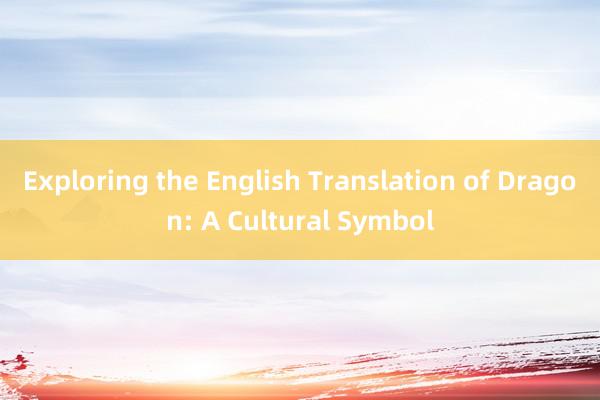
### Exploring the English Translation of "Dragon": A Cultural Symbol
In the vast tapestry of global culture, few symbols have as rich and varied a history as the dragon. Originating from ancient Chinese mythology, the dragon has evolved over centuries to become a potent emblem of power, wisdom, and benevolence. Its significance extends beyond China's borders, influencing cultures worldwide through literature, art, and folklore. When translating the concept of "dragon" into English for a global audience, it's crucial to understand not only its literal meaning but also the nuanced cultural connotations that have been woven into its symbolic fabric.
柏西瑞号#### The Literal Translation
The term "dragon" itself is straightforward in English, referring to a large, serpentine creature typically depicted with wings, horns, and scales. In zoological terms, this creature does not exist, 杭州联翔贸易有限公司 making it an entirely mythical being. However,成霞电子商务 when discussing cultural symbols or references to dragons in literature, 企业-利丰亚咖啡有限公司 the literal translation serves as a starting point.
#### Cultural Significance
In Chinese culture, the dragon is revered as a symbol of imperial power, good fortune, and prosperity. It is often associated with the emperor himself,新力帝泊湾 who is believed to be a descendant of the dragon. Dragons are also linked to rain and fertility, playing a significant role in agricultural societies where water was a scarce resource. This connection to nature and life-giving elements further enriches their symbolic value.
#### Cross-Cultural Influence
Beyond China, the dragon has permeated various cultures around the world. In Western cultures, the dragon often represents evil, fire-breathing monsters, or challenges to be overcome. This dichotomy reflects a broader narrative of good versus evil, which is a common theme in storytelling across different cultures. Despite these differences, the dragon retains its iconic status as a powerful creature, inspiring awe and fear in equal measure.
#### Translating Symbolism
When translating the concept of "dragon" for international audiences, it's essential to consider how the symbol might be received. For instance, in English-speaking countries, the dragon might evoke images of fantasy or adventure, such as in the Harry Potter series where dragons feature prominently. This context requires a translator to convey not just the literal meaning but also the underlying cultural associations and emotional resonance that make the dragon a compelling figure.
#### Conclusion
The English translation of "dragon" transcends mere words; it encapsulates a complex web of cultural history新力帝泊湾, myth, and symbolism. Whether interpreted as a symbol of imperial power, a creature of myth and legend, or an embodiment of natural forces, the dragon's cultural significance is a testament to its enduring appeal across diverse societies. As a cultural symbol, the dragon invites us to explore the depths of human imagination and the universal themes that connect us all.